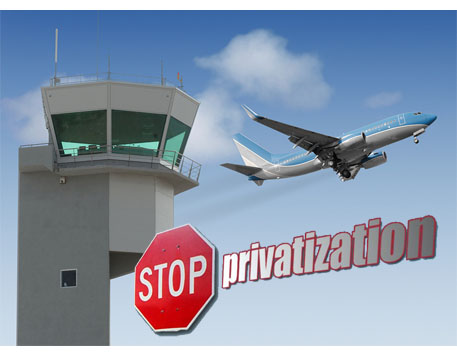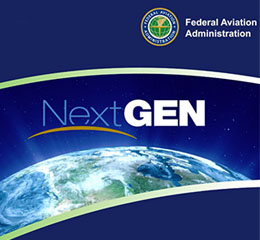OPINION
American aviation safety must remain a public service
Air-traffic privatization push hits turbulence in Congress—with good reason
By MONIKA WARNER
(Sept. 11, 2017) — Message to the airlines: you can’t have it all. Control of the skies and aviation safety is a public service.
Privatization of the U.S. air traffic control system, its equipment, and the jobs of more than 30,000 workers at the Federal Aviation Administration (FAA) is being debated right now in Congress. Legislation proposed in the House this summer by Rep. Bill Shuster (R-Penn.) would put air traffic control in the hands of a corporate board of directors. Shuster is chairman of the Transportation Committee, which has jurisdiction over our aviation system.
The U.S. currently has the largest, safest, and most complex aviation system in the world. That system should continue to be operated solely for the public’s benefit and safety, not for the benefit of a board of directors dominated by special interest groups.
My colleagues and I at the FAA’s Air Traffic Organization, represented by the Professional Aviation Safety Specialists (PASS) union, install, maintain, and ensure the safety of the entire air traffic control system. We support personnel who keep passengers safe by maintaining and certifying the equipment used in electronic tracking, navigation, and voice communication systems. We are on the front lines rain or shine, 24 hours a day, seven days a week. The flying public takes to the skies with peace of mind thanks to the delicate balancing act we perform every day.

Tens of thousands of union members at the FAA would be hurt by privatization. More than 20 public and private sector unions have expressed their opposition to this risky scheme. PASS has been leading the union fight. These are our reasons:
A BAD DEAL FOR EVERYONE
Privatization is bad for workers. The bill would make it nearly impossible for workers to get a union and increase management’s ability to boot an existing union off the property. In a union representation election, the bill changes the definition of “majority.” Rather than counting a simple majority of the ballots returned, the new system would count a non-voter as opposing the union.
While the House proposal claims that the new corporation will honor existing labor agreements, it also says the corporation can “rescind, amend, or alter” the status of bargaining units. That means managers could combine or split union locals to undermine their ability to represent employees. The legislation also fails to guarantee that every collective bargaining agreement will have a grievance process as currently required under federal law.
The bill is silent on key employment laws that workers fought for years to secure. This could mean that Title VII of the Civil Rights Act of 1964 (prohibiting discrimination based on race, sex, etc.), the Americans with Disabilities Act, and the Family and Medical Leave Act do not apply to the new entity.
The legislation would hurt veterans, who would receive no hiring preference, which they currently have as federal employees. Because of this program, more than 60 percent of current employees in the PASS bargaining unit are veterans.
 Privatization is bad for taxpayers. Through the FAA’s modernization programs over the last 20 years, taxpayers have invested more than $50 billion in more than 500 air traffic control towers, hundreds of radar and communication facilities, and more than 70,000 pieces of air traffic control equipment. The House proposal would hand everything over to a private monopoly free of charge.
Privatization is bad for taxpayers. Through the FAA’s modernization programs over the last 20 years, taxpayers have invested more than $50 billion in more than 500 air traffic control towers, hundreds of radar and communication facilities, and more than 70,000 pieces of air traffic control equipment. The House proposal would hand everything over to a private monopoly free of charge.
The nonpartisan Congressional Budget Office reported that privatization would increase the federal deficit by $100 billion over the next 10 years.
The new corporation would be funded by an as yet unknown user-fee scheme, meaning commercial passengers and private plane users will likely see an increase in fares or charges. The monopoly corporation would also be able to shut down its air traffic control services at airports if they didn’t make enough money, potentially slashing service to millions of Americans.
Privatization is bad for aviation safety. Under federal control, the U.S. has continually set the bar for aviation safety standards in the world, with no commercial airline fatality recorded in years. Privatizing the system would sever the collaboration between air traffic control operations and the aviation safety experts at the FAA, eviscerating the very aviation safety culture that is the envy of the world today.
In addition, the uncertainty surrounding the benefits and workplace rights of employees who transfer to the new company could lead to early retirements that would decimate the agency’s expertise and institutional knowledge.
PRIVATIZATION DOES NOT EQUAL MODERNIZATION
 Rep. Shuster and his supporters in airline management claim that privatization is necessary for modernization. But NextGen, the FAA’s modernization plan, is proceeding as scheduled. For example, in PASS’s Region III, which represents air traffic control operations in the western U.S., the FAA commissioned three new air traffic control towers in a 60-day period in 2016.
Rep. Shuster and his supporters in airline management claim that privatization is necessary for modernization. But NextGen, the FAA’s modernization plan, is proceeding as scheduled. For example, in PASS’s Region III, which represents air traffic control operations in the western U.S., the FAA commissioned three new air traffic control towers in a 60-day period in 2016.
The FAA’s Data Comm is being rolled out across the country, enabling air traffic controllers to send text-based departure clearance instructions to flight crews instead of speaking over the radio. Stories you hear about controllers using World War II equipment are simply false.
RESISTANCE
Many groups share PASS’s concerns about privatization, including unions inside and outside the FAA, the National Business Aviation Association, the General Aviation Manufacturers Association, and the Aircraft Owners and Pilots Association. To fend off this attack on aviation safety and our jobs, PASS members have conducted congressional tours and office visits, called our elected officials, and participated in social media campaigns. Even NASCAR has come out against privatization, as has Captain Chesley “Sully” Sullenberger.
Labor and aviation groups are calling for streamlining the FAA funding process rather than privatization. The bipartisan Senate bill (S.1405) is a strong step toward continued government support for the FAA, with improvements to operations and funding and no privatization language. There are ways to stabilize the FAA’s funding which will support the system’s stellar safety record and that do not include gambling with safety.
We are here to say to the airlines, you can’t have it all. The air traffic control system and the FAA’s safety functions must be protected as a vital public service and remain in the public trust.
 Monika Warner is Professional Aviation Safety Specialists WA3 Chapter President and Public Relations Chair. PASS represents more than 11,000 employees at the FAA and the Department of Defense. This column originally appeared in LaborNotes and is posted here with the author’s permission.
Monika Warner is Professional Aviation Safety Specialists WA3 Chapter President and Public Relations Chair. PASS represents more than 11,000 employees at the FAA and the Department of Defense. This column originally appeared in LaborNotes and is posted here with the author’s permission.





